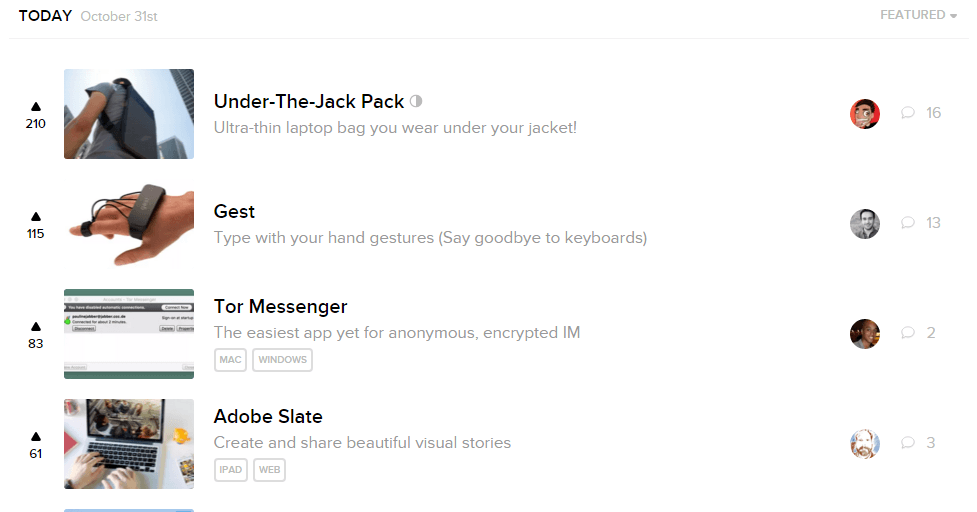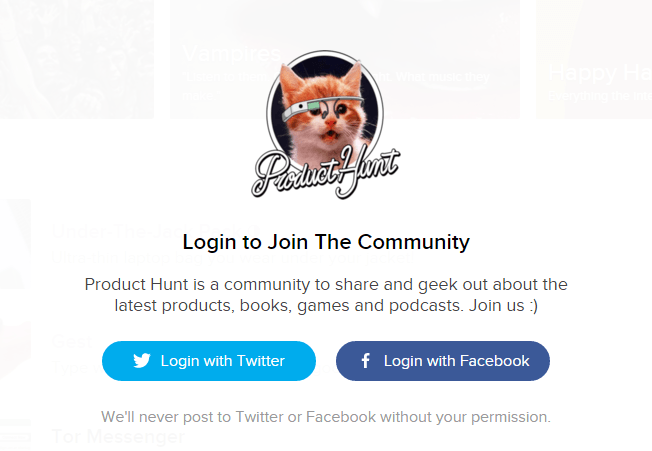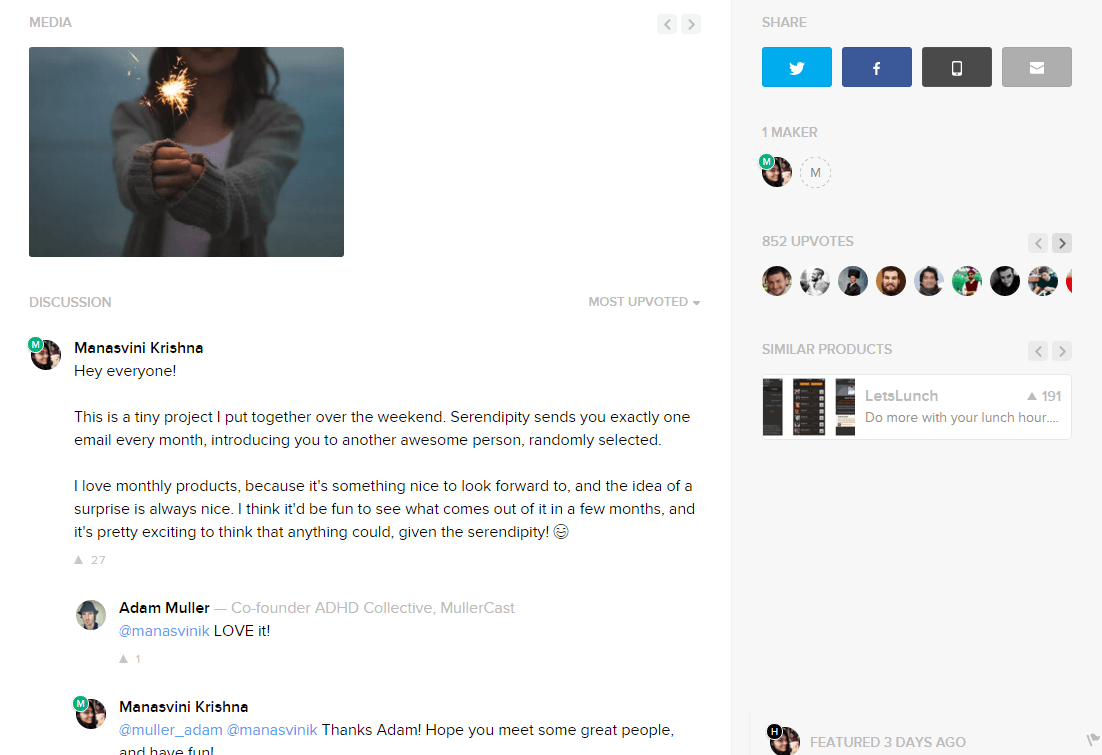Finding the Next Unicorn with Product Hunt

Product Hunt is an upvote-based site, similar to Reddit, where community members submit and vote for their favorite new or unknown products, primarily focused on the tech app space. The list is recreated each day, generating a live-stream of the most popular and top-of-mind products in the community at the moment. The quality of the Product Hunt community has created a great deal of value for product “hunters,” product makers, and others in the tech space, including journalists and investors. Among the next steps for Product Hunt is figuring out how to grow responsibly and monetize their platform to capture some value for themselves.


Anyone can sign up for Product Hunt. You can receive the daily email, vote on products, and add a collection of products as a new user. However, you have to be invited by a current community member in order to submit or comment on products. Getting an invitation requires that you either know someone already in the community or that you’ve demonstrated participation on the site through voting on products and creating product collections. Additionally, you can demonstrate participation through “thoughtful discussion on Twitter.” The ending result of this limitation is that the ability to comment and post products is reserved for the top 1-2% of members and is seen as a badge of honor. New members are incentivized to participate in order to reach that status. Additionally, the content generation on the site is limited to the most well-respected and active community members who are often journalists, entrepreneurs, or VC investors.

While these limitations have likely limited the acquisition of users, resulting in only a few hundred thousand unique monthly visitors, those users are a highly dense core of influencers whose thoughts and opinions are well respected. While the opinions generated from the site are not sourced from the widest user base, they are generally considered to be good indicators of a product’s likely success or failure. As a result, the tech community, especially, has come to rely on the site for forecasting what the “next big thing” will be. Given the positive impact being listed on Product Hunt has had on products, Product Hunt has recently added new functionality to allow select journalists to message product makers directly and offline. They are also considering opening the direct communication channel up to key investors in the community who might be interested in funding certain products.
In addition to new functionality, Product Hunt has also started to move into adjacent spaces. Following its completion of the Y Combinator program, Product Hunt raised a $6.1M Series A round, led by Andreessen Horowitz, in October of 2014. Some of that funding has gone toward expanding their coverage into games, books, and podcasts. While expanding into new verticals makes sense, Product Hunt should be sure to maintain the same selectivity in the choice of content generators to ensure that the quality of submissions is equally strong across the site.
Product Hunt has also been thinking about ways to capture some value through monetizing the community. As Ryan Hoover, the founder of Product Hunt, mentioned in a recent Business Week article, the key to maintaining the quality of the community while beginning to capture value is to ensure that whatever monetization moves they make do not disrupt the community. Affiliate revenue would likely be the least disruptive model where they simply setup a referral fee or revenue share for users successfully directed to a product through the site. However, given that the object of the site is to post a new list of, often, very new products every day, it may be difficult to get enough of these products signed up for such a program to generate much revenue without limiting the submission pool to products that have already signed up, which would likely be very disruptive to the community. One interesting suggestion from the article was to allow products that were previously submitted to pay for promotion on the homepage. Limiting the pool of promotable products to those that have already been vetted by the community seems very much in line with the objectives and values for the site in general. As the community grows, it would also give users who have joined more recently the ability to see some of the favorites and success stories from past lists.
Whatever path they choose, it is clear that they have secured a spot as a key player within the tech community.



Interesting article. I’ve been using product hunt for quite some time, and love the website. I’ve discovered many interesting products that I’ve used for my business and in my personal life.
I found product hunt’s series A funding incredibly interesting because I would have never expected that a company would need millions of dollars to create an upvoting platform as simple as the one they operate. On the surface, I’d expect a minimal investment in the technology behind the website. However, the high price tag shed’s light on the difficultly of creating, and monetizing, a crowdsourcing platform.
I’m interested to see how product hunt will begin monetizing their content while maintaining the same level of user loyalty.
Cool post! I think it’s great how Product Hunt manages the integrity of the community and the posts by creating a system by which users need to essentially “earn” the right to submit products and comment — certainly helps build the broader trust system needed for this type of crowdsourcing platform to work. I think that adding in a direct communication channel for investors could be a huge benefit for the platform; in addition to taking some cut of the investment, I could see this becoming a much more elevated, streamlined alternative to Kickstarter — where product demand, proof of concept, company viability are already pre-vetted (and with higher investment tiers, etc.).
I really enjoyed using Product Hunt during its earlier days and still check it daily, but recently something’s felt a bit off about the listings. It’s as if posting a product on Product Hunt is now an activity that can be “maximized” through a set of PR and marketing checkboxes. This was probably inevitable, but to me makes the website feel much less authentic, and makes me worried about its future.
This problem doesn’t just affect PH, but also any site that can be used as publicity for a new product (mostly in the tech space). Another prominent example is Kickstarter – today, being able to launch a “successful” Kickstarter campaign is really more of a marketing exercise. If you do X, Y and Z, the chances of your campaign succeeding are greatly magnified. There are now similar “best practices” for PH (e.g. posting at a specific time of day or day of week, having a certain kind of tagline, etc.). My worry here is that this detracts from the site’s ability to reliably signal what it’s trying to promote: Kickstarter for the “crazy idea” that people actually demand, and Product Hunt for the “cool new” product that you otherwise would not have heard of.
PH has recently gone into a couple new “types” of products such as Books and Games. What’s interesting to note is that these do not seem like they’ve caught on yet – the amount of activity on those lists are orders of magnitude smaller than for the core Tech list. Part of me wonders if this is because these new lists don’t suffer as much from the problem of “best practices” that affects Tech.
This decrease in authenticity worries me, but it does solve another problem: how to differentiate the interesting “signal” products from the much less interesting “noise” products. During my daily check of PH, I’d guess that 95%+ of the products listed are not that interesting. But, the products that are interesting are usually those that have the most upvotes, which I’d guess are also the group of products that have used the “best practices” mentioned above. So perhaps this speaks to some balance that needs to be struck on sites like these, a balance between best practices that legitimately signal quality vs. not allowing these best practices to have so much influence that they can completely make a low-quality product look like a high-quality one.
Thanks for a great post! I used Product Hunt quite often this summer working to better understand what type of consumer app trends were gaining traction in the market to support the start-up I was at. I found the comments to be very insightful, and now it’s even more apparent as to why! My one thought around having a very exclusive comment community however is whether the general opinions coming from Product Hunt will become too polarized as a result. Obviously, a new product will need to convince skeptics that it can work (and I assume Product Hunt users will be a hard audience to convince), but I wonder if perhaps the opposite effect could result as well; the most sophisticated technology participants might think something is innovative or breakthrough when, in fact, it might be that the general public may not be ready for such an offering. By limiting those who can participate, I wonder if important opinions may be excluded.
Thanks for the article. Product Hunt is one I check quite often, as it consistently mines out gems I otherwise would not have found. Some are better than others, and the site does cater more to designers than anything else (which impacts the type of products that rise to the top), but the community is expanding and broadening. They’re also expanding into different verticals such as podcasts. They’ve wisely controlled the size and quality of their community, which is its greatest asset at this point. Well done so far and excited to see what comes of it.
Thanks for the post, David! I love Product Hunt – not just for the app/start-up recommendations, but also for the “Collections”, which include some of the best articles, podcasts, and YouTube videos for entrepreneurs.
I agree with you that Product Hunt has done a good job by limiting who can post and comment on specific products. It minimizes the opportunity for individuals/entrepreneurs to ask its consumers/friends/family to flood the platform with upvotes and positive commentary, which ensures a higher level of authenticity. I think in the guidelines, Product Hunt actually detects voting rings and spam, which could remove individuals from its platform altogether. Plus, it’s a lot more rewarding when people choose you as one of the great start-ups.
While ensuring authenticity with limited posts is a positive, the company does need to determine a strong growth strategy for both the investors and the owners. I’ll be excited to see how Product Hunt manages this balance between growth and authenticity.